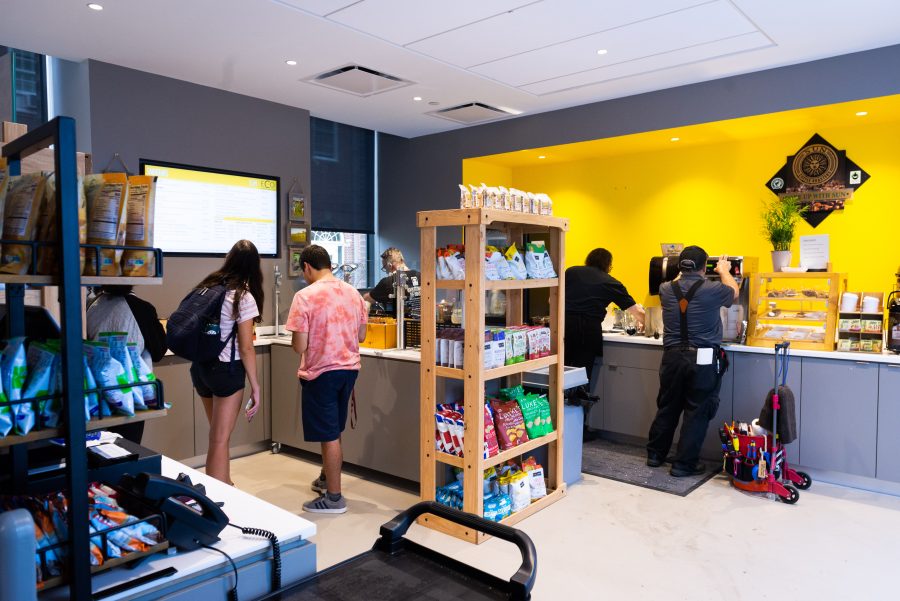Along with labs and high-tech classrooms, the recently opened Rockwell Integrated Sciences Center (RISC) is home to a new, eco-friendly dining option that has already become frequented by students with many options selling out before 12:30 p.m. this past week.
The ECO Cafe, a locally sourced and sustainable cafe, opened this past Monday in the Rockwell Center. Its name stands for “Environmentally Conscious Options,” which was chosen by students.
Open from 7 a.m. to 7 p.m. on weekdays and 10 a.m. to 3 p.m. on weekends, the cafe serves a variety of healthy and sustainable options. Unlike Skillman Cafe, which only accepts meal swipes during the lunch hour, ECO Cafe accepts meal swipes at all times of the day, providing more flexibility for students with different schedules.
A wide assortment of smoothies is available. Students may recognize some, such as “The Awakening” from Gilbert’s Cafe, while many, such as the aptly named “So Kale Me Maybe” and “Beet It” are new this year.
Additionally, there are many meal swipe options such as salads, sandwiches, pasta entrees, soups and protein boxes, that include a chip option and a drink. Smoothies do not count as an included drink, but meal swipes can be used on them individually.
The cafe also hosts a number of homemade energy bars, locally made kombucha, organic beverage options and various types of chips and cookies. Notably, the cafe has a strong commitment to providing sustainable options for students, faculty and staff.
For example, according to Sustainability Coordinator Kendall Roberson, ECO cafe uses paper for its packaging instead of plastic. Once the compost system at the cafe is in operation, the paper boxes will be able to be composted as well.
ECO cafe is “trying to find little ways to reduce the amount of waste…produce[d] with a grab-and-go cafe,” Roberson said.
“We’re trying to make everything we serve in the ECO Café as local as possible,” Executive Chef John Soder added in an email.
According to Soder, the turkey comes from Koch Turkey Farm in Tamaqua, the chicken from Murray’s and the beef a 200-year-old farm called Koehler Farm. The cafe’s bread is locally baked and the honey is from Sandt’s Honey Company, located here in Easton.
“We’ve started buying from Bechdolt’s Orchard just down the road in my hometown Hellertown, we have blueberry cider this week, we’ll have peach cider next week,” Soder wrote. “We’ve also started buying High Point Kombucha out of Allentown, PA — the owner, Laura Valasako, told me we’ve doubled her sales.”
The pasta and soup come from Pastificio 601 in Easton, owned by alumni and former football player Phil Noto ‘72.
“John knows the names of the families on the farms…He is really great at finding that sort of thing, and I think he enjoys it, which is why he did it for us, so he helped us find a lot of local vendors in the area,” Roberson said.
Additionally, the LaFarm Sandwich features produce from LaFarm, located in Forks Township, harvested by Lafayette students.
Bon Appétit, Lafayette’s on campus food service provider, defines sustainable food as “flavorful food that’s healthy and economically viable for all, produced through practices that respect farmers, workers, and animals; nourish the community; and replenish our shared natural resources for future generations,” according to their website,
“We meet those guidelines through local sourcing, sustainable seafood, Certified Humane ground beef, pork raised without gestation crates, cage-free eggs, Fair Trade certified coffee, and a lot more. We never say we ‘are sustainable’ — we’re not perfect by any means but we strive to be the best we can be,” Soder wrote.
The process of adding and choosing food for the cafe was brought about by a collaboration between the Office of Sustainability and Lafayette Dining Services.
“It seemed really fitting that with our LEED certified building with environmental studies, environmental sciences, biology, all these very sustainable things, that we would also try to make what’s happening inside the building sustainable,” Roberson said.
Roberson’s role in this process focused on figuring out student interests for the cafe and then determining what would be feasible through meetings with Bon Appétit.
Roberson said that conversations with students, faculty and staff drove the idea to start a sustainable cafe.
“A lot of staff and faculty don’t feel like there are great options for them to eat on campus,” Roberson said. “For them specifically, I was trying to find…a space where they could hang out in this beautiful atrium together…and not have to go off campus for lunch or bring their own lunch.”
Roberson also explained that some students have felt their dietary needs, such as gluten-free, vegetarian, vegan or allergy-friendly, are not always adequately met on campus at other dining options.
A conversation around catering to these dietary needs led to the idea to sell more plant-based items, since anyone can eat them, Roberson explained. This in turn led to ideas on how to make the cafe feature local foods so students can both understand what is available in the Easton community and eat food that fits into their diet.
While Roberson feels that this cafe provides an opportunity to test out sustainable dining options on a smaller scale, she hopes that some of the ideas and systems will spread throughout campus.
“I would hope that [cafe customers] can see that this cafe is different than other things on campus…one, to help you weigh your carbon footprint when you have food options, trying to understand where your food comes from and how important that is, but then also that this is different and we’re trying something different,” Roberson said.
Danielle Mullan ‘22 had mostly positive feedback towards the restaurant, describing the LaFarm sandwich as “perfect.” She did note, however, that the food’s paper box packaging prevents consumers from being able to see their lunch before purchasing it.
Kristin Dingelstedt ‘22 liked the variety of drink selections and the meatballs in the pasta.
Roberson said that she personally likes the chickpea ‘chicken’ salad, while Soder enjoys the High Point Kombucha, the overnight oats and the house-made energy bars.




















































































































